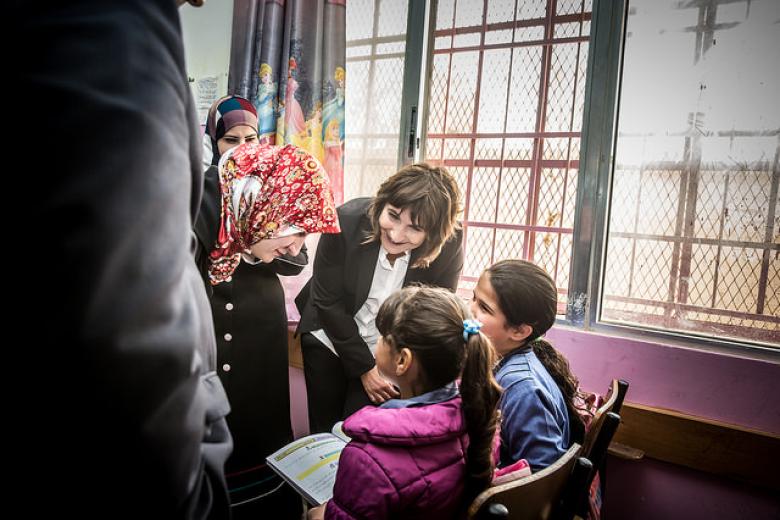Weer een steen in de muur? (deel 1)
Op 7 maart 2017, concludeerde de CJEU dat EU-wetgeving haar lidstaten niet verplicht om humanitaire visa af te geven aan Syrische individuen en families die internationaal bescherming zoeken. Ondanks de humanitaire ramp in Syrië, blijven veilige legale routes naar Europa een illusie. (Alleen beschikbaar in het Engels)
Notes on the CJEU’s ruling on humanitarian visas for Syrians (Part 1)
As a response to the largest humanitarian crisis since World War II, international human rights actor and NGOs have repeatedly called for the creation of safe legal routes from Syria to Europe, to be used by individuals and families in need of international protection. Following a bold opinion of Advocate General Mengozzi in C-638/16 PPU, X and X v État Belge, human rights circles hoped that the Court of Justice of the European Union could pave the way for the establishment of such channels. The question the Court had to address may be reformulated as follows: does EU law, and in particular the Charter of Fundamental Rights, require Member States to grant humanitarian visa to Syrians, in order for them to reach the territory of the Union and seek asylum there? To the disappointment of many, and the relief of Belgium (“Yes! Gewonnen!”, the Belgian State Secretary for Migration and Asylum tweeted few minutes after the ruling) and the other thirteen intervening Member States, the Court decided the type of visa sought by the applicants falls outside the scope of EU law. Hence, the Charter is not applicable and cannot limit the discretion of national authorities in deciding whether or not to confer a humanitarian visa to the Syrian family.
In this blog post, I am arguing that that the judgment of the CJEU is not only disappointing from a human rights perspective, but also from a (institutional and substantive) EU law one. More generally, the very style of reasoning used by the Court is unconvincing, to say the least, and raises new questions on the role of the institution and on its ability to fulfill the mandate assigned by the Treaties in its entirety. This first part of the post briefly introduces the facts of the case and the questions referred to the CJEU, and then presents the ruling of the Court. A second, separate post critically analyzes the decision, contrasting it to the Opinion of the Advocate General Mengozzi and drawing some preliminary conclusions on the impact of the judgment.
The applicants in the case were a married couple and three children, a Syrian family from Damascus. In October 2016, the family travelled from Syria to Beirut and submitted to the Belgian Embassy in Lebanon an application for a humanitarian visa with limited territorial validity (LTV), on the basis of Article 25(1)(a) of the Visa Code (Regulation 810/2009). On the following day, they returned to Syria. The purpose of the visa, as disclosed in the application, was to allow them to leave Aleppo and safely reach Belgium, in order to apply for asylum in the country. The Belgian Immigration Office however refused to issue the visa, stating that the applicants had the intention to stay in the territory of the country for more than 90 days – where the Visa Code only covers visa not exceeding 90 days in any 180-day period. The applicants challenged the decision before the Council for Asylum and Immigration Proceedings, claiming that the EU Charter of Fundamental Rights (Articles 4 and 18) requires Belgium to issue the visa they were seeking. The Council referred to the CJEU two questions for preliminary ruling, with – in short – the aim to understand whether the Charter is applicable to the situation of the applicants and whether it obliges Member States to issue the visa in question.
In a rather short judgment, the Court concluded that, while it had jurisdiction to decide on the case (contrary to the submission of the Belgian government), the situation at stake fell outside the scope of EU law. The CJEU stressed that the Visa Code merely provides the procedure for the issuing of visa with a limited temporal validity: 90 days maximum. It was indeed adopted on the basis of Article 62(2)(a) and (b)(ii) of the EC Treaty, according to which the Council could adopt measures for visa intended for stays of no more than three months. The situation of the applicants was however different, according to the Court, as they requested the visa with the ultimate objective to apply for international protection in Belgium, thus with the intention to remain in the country for more than 90 days. Such an application, concluded the CJEU, “falls outside the scope of [the] code, in particular Article 25(1)(a) thereof”. While there would be a legal basis in the TFEU, in Article 79(2)(a), for the adoption of measures regulating the issuing of long-term visas and residence permits on humanitarian grounds, that legal basis has not yet been used by the EU legislator. In accordance with the Court’s findings, the EUCFR is not applicable, since Article 51(1) of the Charter, as interpreted in Akerberg Fransson, states that the instrument is applicable to the Member States only when they act within the scope of EU law. The conclusion of the Court is clear: EU law cannot help the applicants in the present case.
Is the Court’s decision another brick in the wall of Fortress Europe? Or can the reasoning of the CJEU be justified on the basis of EU law? The second part of this blog post will critically analyse the decision and illustrate its consequences.
Image by seier+seier: Roman theatre, Bosra, Syria.
Deze blog is gepubliceerd op Law Blogs Maastricht
M. Bonelli
Matteo Bonelli is Associate Professor of EU Law at the Faculty of Law of Maastricht University.
Matteo's research focuses on EU constitutional law, and in particular on the EU's tool to protect its fundamental values. I have published also on other topics of EU institutional, constitutional and fundamental rights' law.
In Maastricht Matteo is a member of the Maastricht Centre for European Law (MCEL) and the Globalisation and Law Network.

-
Weer een steen in de muur? (deel 2)
Deze tweede blog geeft een kritische analyse van het besluit van het Hof, waarin wordt besproken dat het niet overtuigend is vanuit verschillende perspectieven. (Alleen in het Engels beschikbaar)

-
Hof van Beroep troeft Trump
Toen Trump twitterde "Tot ziens in de rechtbank, de beveiliging van ons land staat op het spel" had hij beslist gelijk, maar niet zols hij het bedoelde. Want rechtbanken zijn onontbeerlijk voor de veiligheid (van inwoners) van de Staat. (Engelstalige blog)

-
Seksuele en reproductieve gezondheidsrechten: Trump’s decreet en de Nederlandse reactie
Deze bijdrage stelt dat Trump's decreet voor financiële steun van de US voor gezondheidsorganisaties die informatie verstrekken over seksuele en reproductieve gezondheid, in strijd is met mensenrechten. De reactie van de Nederlandse regering is meer in lijn met de rechten van de mens. (Engelstalige...
